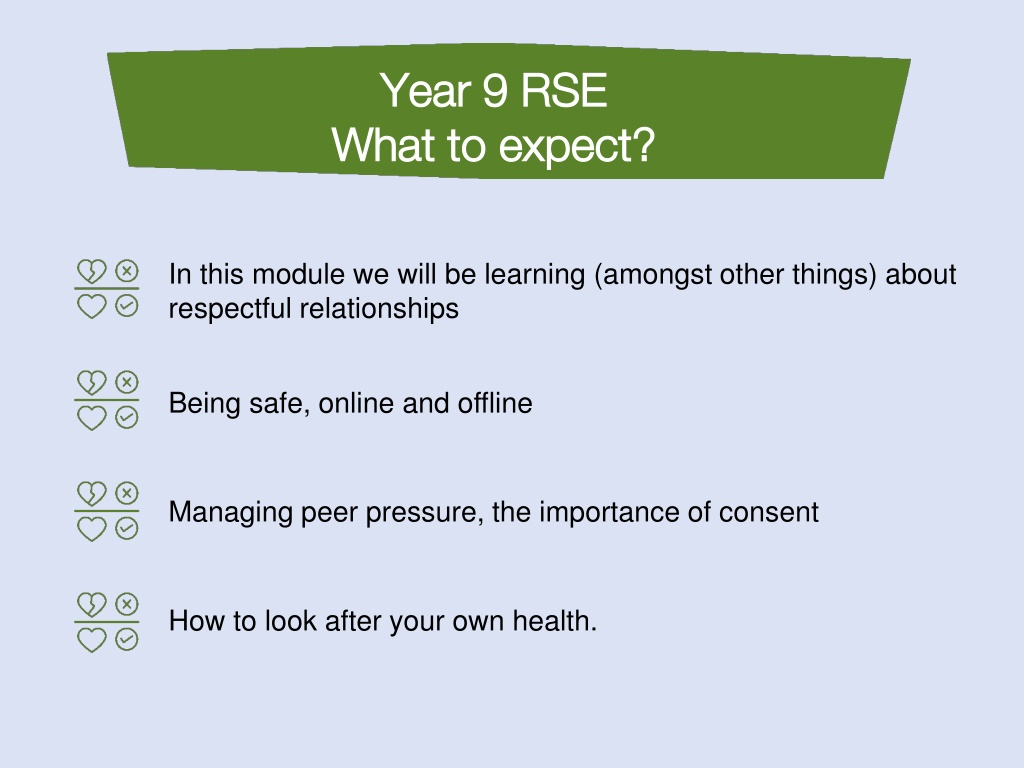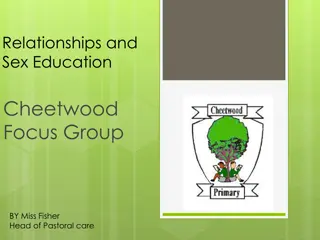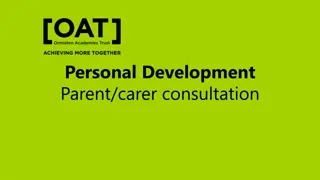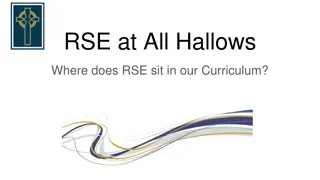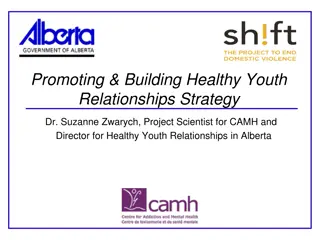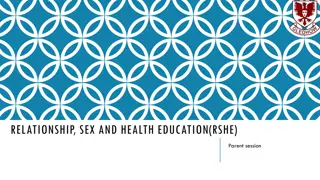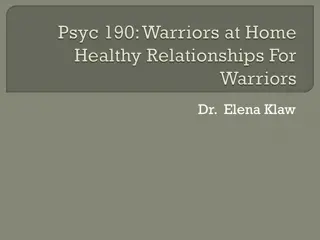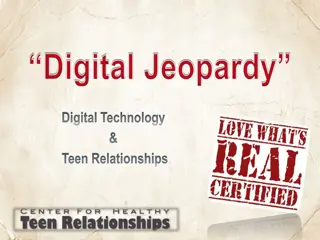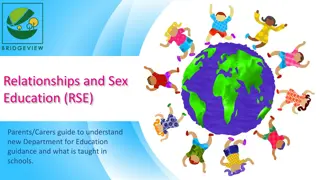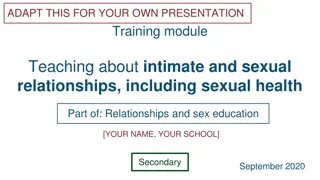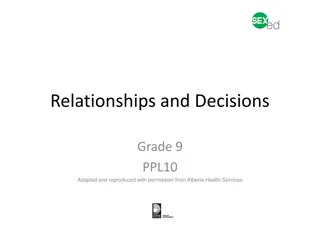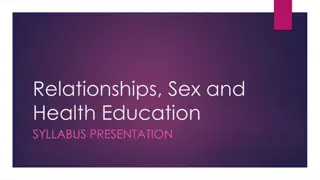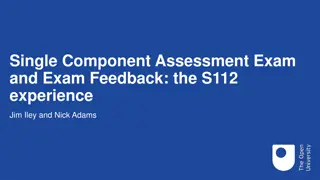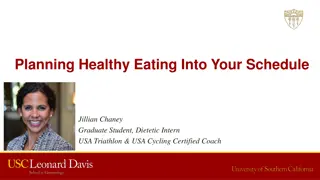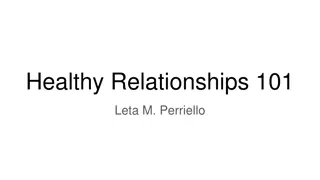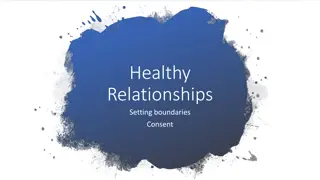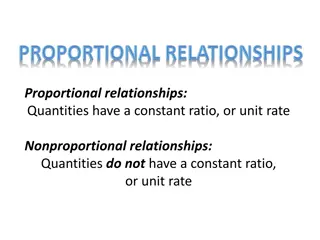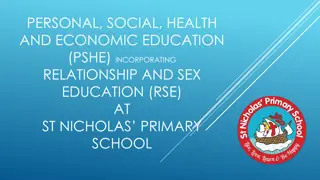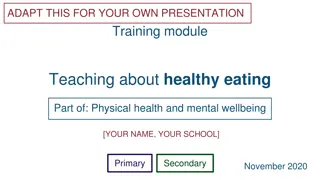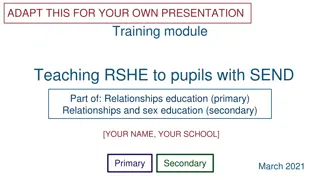Understanding Healthy Relationships in Year 9 RSE Module
Explore topics on respectful relationships, online safety, peer pressure, consent, and self-care in the Year 9 RSE module. Learn about healthy and unhealthy relationships, identifying signs, and providing advice in various scenarios. Engage in activities to understand the importance of positive connections and communication in relationships.
Download Presentation

Please find below an Image/Link to download the presentation.
The content on the website is provided AS IS for your information and personal use only. It may not be sold, licensed, or shared on other websites without obtaining consent from the author. Download presentation by click this link. If you encounter any issues during the download, it is possible that the publisher has removed the file from their server.
E N D
Presentation Transcript
Year 9 RSE Year 9 RSE What to expect? What to expect? In this module we will be learning (amongst other things) about respectful relationships Being safe, online and offline Managing peer pressure, the importance of consent How to look after your own health.
Before we begin We listen and respect everyone when they are speaking and when we are responding. We know that we don t have to participate in any activities or questions which make us feel uncomfortable. We know that we are not expected to share our own personal experiences but are free to do so without judgement if we want to. We speak about a friend or someone we know instead of using real names if we share experiences or stories.
Year 9 SRE Lesson 1: Healthy Relationships In today s session, we will look at: What constitutes a healthy relationship. How to spot the signs of an unhealthy relationship. What you can do if you or someone you know is in an unhealthy relationship.
Starter questions How would you define a relationship? Who do you have relationships with? Could you spot and name signs of an unhealthy relationship?
What IS a relationship? Who can you have a relationship with? Relationship: The way in which two or more people are connected. The way in which two or more people or groups regard and behave towards each other. Relationships can be with: Friends Relatives Partners Colleagues/peers Any others?
Your task: Consider in pairs, the features of a healthy, positive relationship, and how someone in a healthy, positive relationship should feel. Can you put the features in order of importance according to the diamond 9 on your handout
Look at the following scenarios: Can you spot any signs of healthy or unhealthy behaviour/relationships? What advice would you give? 1. My boyfriend wants to know where I am at all times, but I think it s ok because he tells me he loves me. 2.My partner gets annoyed if I spend too much time on my phone and keeps asking who I m talking to. 3. My partner tells me to take down photos on Instagram if other boys like my photo. 4. My partner tells me what I can and can t wear but I know it s because he just wants me to look my best.
5. My girlfriend gets worried if I am not home by the time I said I would be and I don t answer her calls. 6. I used to like going to the gym but my girlfriend prefers it if I don t, so I ve stopped. 7. My best friend is so nice - she s always getting me little gifts. 8. My boyfriend is so thoughtful. He s always surprising me by turning up unexpectedly, like at home or at a friend s house.
9. My boyfriend says I dont need make-up and Im pretty enough without it, so I don t wear it anymore. 10. Last night my partner and I got in a fight and he slapped me. I shouldn t have annoyed him and he has apologised loads and I know he loves me.
Were now going to watch a short clip on healthy/unhealthy behaviours Once you ve finished watching, you will have the chance to discuss what you saw.
Any thoughts to share on what you just saw? What about behaviour online? Is behaviour online any different? Have a quick look at the next 2 scenarios (on screen) and answer the questions in pairs.
What type of relationship is this? Does it seem unhealthy or healthy? Why? Are there examples or both types of behaviour in this message? What does it tell you about the relationship? How would you reply?
What type of relationship is this? Does it seem unhealthy or healthy? Why? Are there examples or both types of behaviour in this message? What does it tell you about the relationship? How would you reply?
TOP TOP TIPS TIPS
Arguments vs controlling/abusive behaviour? What is the difference between abusive behaviour, and a normal healthy argument? A normal healthy disagreement can happen between people who feel able to express their views and opinions, but also respect those of others. A healthy disagreement normally involves negotiation, and no one emerges as the winner or loser .
Emotional vs Physical Abuse What are your thoughts on the following: It isn t really abuse if it s not physical. It is sometimes justified to hit your partner during an argument. Physical abuse is more serious than emotional abuse. Emotional abuse is just as serious as physical abuse, as the impacts can be just as long-lasting.
Warning Signs What are the warning signs that someone might be in an abusive relationship? What stops people asking for help? Why might a target of abuse find it difficult to leave an abusive partner or take action to protect themselves?
No-one elses behaviour should ever make you or anyone else feel unsafe, threatened or make you stop what you want to do. Emotional and physical abuse are both wrong. If you need support, speak out.
Reflection Do you feel differently about anything as a result of what you have seen and heard in this session? Has anything surprised or shocked you? Can you describe what a healthy relationship is? If someone you knew was experiencing any form of control or abuse would you know how to get help? Do we have a responsibility to help someone who is being abused or is it up to them ? What might happen if we do nothing? How might we feel about that? How can someone end an abusive relationship? What could happen if they didn t? What might stop someone seeking help with an abusive relationship? What might encourage them to seek help?
Getting Support If you ever have a concern, either for yourself or for someone else, it s really important to seek support. You can speak to any trusted adult. If you want to report a concern, you can use the Whisper tool, which is anonymous or the Safeguarding and Wellbeing reporting tool (please note that this is NOT anonymous). Links to both of these are on the Reporting concerns page on the school website. The next slide shows some organisations/charities which can support
Helplines for young people Where can I go for advice, help and support? Services for young people to talk to someone anonymously without judgement via chat, or via phone, on whatever issue they would like. 0800 11 11 - A service for under 18s 0808 808 4994 A service for 13-25s 0808 802 4040 A confidential service for anyone concerned about violence or abuse in a relationship Advice Website for advice and reporting If someone has asked you to do things online that you don t feel comfortable with or to meet up offline, Thinkuknow offers a reporting tool and advice about staying safe online www.thinkuknow.co.uk. Support
